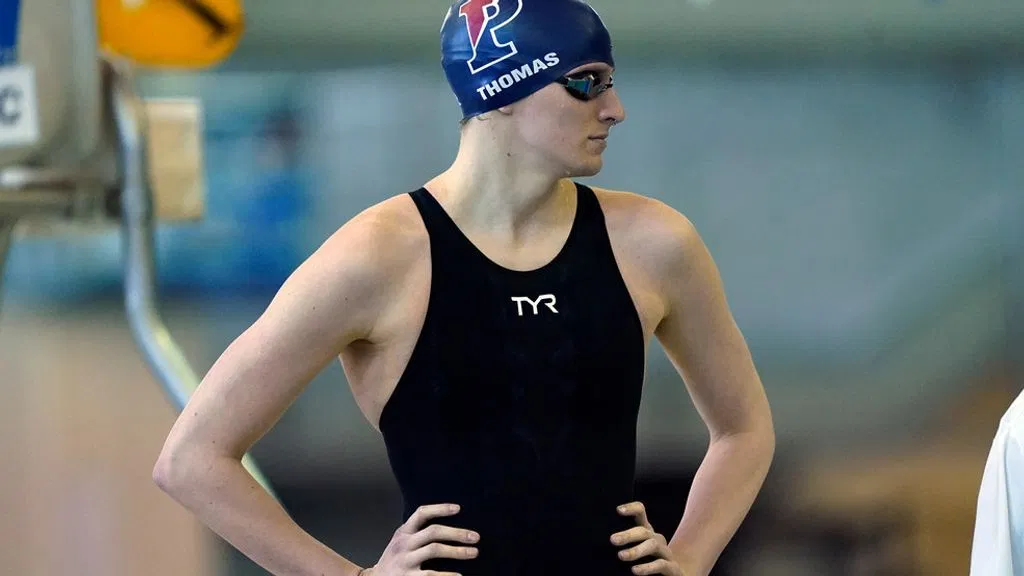Photo credit: AP / John Bazemore
By Chloe Hunt
Penn alum Lia Thomas, accomplished transgender swimmer who graduated in 2021, recently lost her case against World Aquatics, attempting to challenge their current policy on transgender athletes. Thomas filed the case in January, citing World Aquatics’ transgender policies as discriminatory for not allowing any transitioned females who have undergone “any part of male puberty” to compete.
The Court of Arbitration for Sport panel dismissed Thomas’ case, with Thomas referring to the decision as “deeply disappointing” and a “call to action”. In the deciding ruling, the Court cited Thomas as someone who “lacks standing to challenge the policy and operational requirements in the framework”, considering that Thomas herself has not competed in World Aquatics events and was not a member of USA Swimming when filing the case.
Thomas’ involvement in the world of collegiate athletics has created shifting attitudes towards transgender participation in sports, with the Biden Administration releasing new Title IX rules that completely shifted from that of the Trump Administration.
Released April 19, 2024, the new Biden Administration policies demonstrated a redesign of what sex discrimination means under Title IX, adding new protections for “sexual orientation and gender identity.”
The original Title IX policy was only 37 words, one sentence that stated no person of the United States shall be denied participation in or excluded from any educational program on the basis of sex. The new policy is over 1,577 pages.
Additionally, these policy changes by the Biden administration pivoted from that of the former administration, bringing back new and widely debated protections for students who allege harassment and sexual assault that were removed under Trump.
Certain governors, such as the Nebraska Governor Jim Pillen (R) have openly stated that their states “will not comply” with these changes. Other states, including Louisiana, Florida, Wyoming, North Carolina, and Oklahoma, have pushed back against these measures.
These policies arrive at a pivotal moment in gender and athletics, following the March 2024 lawsuit against the National Collegiate Athletics Association (NCAA) filed by more than sixteen female athletes, including swimmers and volleyball players, over its transgender eligibility policies.
When the NCAA convened in January 2022, the Board of Governors updated their transgender participation policy with three phases of implementation.
Involved athletes argued that the NCAA’s newly revised transgender participation policies “adversely impact female athletes in violation of Title IX,” with the lawsuit expressing complaints about general concerns and an alleged instance at the NCAA national swimming championship in Atlanta, Georgia.
Title IX, found constitutional under the 14th Amendment, and signed into law in 1972 by President Richard Nixon, originally stated, “No person in the United States shall, on the basis of sex, be excluded from the participation in, be denied the benefits of, or be subjected to discrimination under any education program or activity receiving Federal financial assistance.” Since the inception of Title IX, various court proceedings have supported women in sports.
At the NCAA Championship in 2023, former swimmer for the University of Kentucky, Riley Gaines, tied for fifth place with Lia Thomas, a now graduated swimmer from the University of Pennsylvania, in the 200 freestyle competition. Allegedly, when preparing for the award presentation, an NCAA official told Gaines that only Thomas could hold the trophy.
Gaines has since centered her post-collegiate platform on “defending women’s single-sex spaces, advocating for equality and fairness, and standing up for women’s safety, privacy, and equal opportunity”.
At the University of Pennsylvania, no current women’s swimmer has taken an outspoken stance against alumna Lia Thomas’ participation in women’s sports. However, Paula Scanlan, former swimmer for the University of Pennsylvania who swam alongside Lia Thomas, who was not part of the previously mentioned lawsuit, has been a vocal advocate for women’s rights in sports.
When Thomas transitioned, Paula remembers feelings of discomfort among the Women’s Swimming Team. Scanlan spoke exclusively with The Pennsylvania Post to discuss the role of the National Collegiate Athletics Association (NCAA) in transgender rights in sports.
While at the University of Pennsylvania, Lia Thomas underwent her transition from male to female, competing in the 2017-18, 2018-19, and 2019-20 seasons as a male. In Thomas’ final season before transitioning, she ranked 554th in the 200 freestyle, 65th in the 500 freestyle, and 32nd in the 1650 freestyle. She was ranked 4th in the Ivy League, and set a pool record at Penn’s Sheer Pool in the 1000 freestyle.
After her transition, while in her senior year at the University of Pennsylvania, Thomas garnered many accolades, with Penn even nominating her as NCAA Woman of the Year.
Scanlan reflected on Lia’s introduction to the Women’s Team and misconceptions about where Lia would change. Penn’s Sheer Pool has a men’s locker room, a women’s locker room, and a family bathroom.
“There’s this one stall family locker room,” Scanlan said, “… when we found out Will was going to be joining the Women’s Team, we were told Will would be in that locker room. Then, when the season started in 2021, one of my teammates had a locker next to him [in the women’s locker room], and she went to the coach and said this had to be a joke. The coach said nothing could be done.”
Scanlan, like many female collegiate swimmers, wrote to the NCAA to express her discontent at the situation.
“The NCAA had a lot of opportunities to fix this…myself and others have tried to write letters,” Scanlan said, “and even during the season there were hundreds of letters from athletes from various schools. They had an opportunity to fix this for a while and did not.”
At the 2022 NCAA Championships in Atlanta, Georgia, other female collegiate swimmers expressed distress at changing in the same locker room as Lia Thomas. Riley Gaines said, “I can attest to the extreme discomfort in the locker room from 18-year-old girls exposed to male body parts and having to undress with a male watching in the same room”.
Scanlan told the story of Kylee Alons, a swimmer from North Carolina State, who swam at the 2022 NCAA Championships. Alons, uncomfortable with changing in the same locker room as Thomas, found another location.
“After she changed in the locker room and Lia was present, she changed in a janitor’s closet, taking turns with her teammates at the NCAA championships,” Scanlan said. “There are Olympic gold medalists competing at the championships, and she had to change in a janitor’s closet in order to feel comfortable racing.”
Scanlan shared how uncomfortable it was for herself and other members of the women’s swimming team to be in the locker room with an individual who has male genitalia. The women’s swim team was told to go to Penn’s Counseling and Psychological Services (CAPS) if they were uncomfortable with Lia in the women’s locker room. According to Scanlon, no swimmers on the women’s team consented to Lia being in the women’s locker room.
Scanlan shared that this was a large distraction from normal routine for the swim team.
“It was incredibly distracting and sort of a big elephant in the room,” Scanlan said. “When I would wear my gear from practice, students would come up and ask me about the situation. It was an all-consuming distraction. The worst part was that the University of Pennsylvania made it worse because they invited the media to come to our meets, and they highlighted the accomplishments of Lia compared to other swimmers on the team.”
While a swimmer for the University of Pennsylvania, Scanlan remembers feeling as though student voices did not matter.
“I think the University of Pennsylvania had a lot of opportunities to navigate this situation better,” Scanlan said. “They brought in officials to tell us that we needed to go to CAPS if we had to object. They did not even try to understand where we were coming from.”
Scanlan understands that Penn was in a “tough position” with Lia Thomas, considering the guidelines provided by the NCAA.
“I understand that the University was in a tough position because the NCAA policy allowed this,” Scanlan said, “but they did not allow for conversation about this. They said you will not speak about this, you will lose your job, everything you worked for, go to CAPS if you have problems about this.”
When asked about how Scanlan perceives the future of transgender people in sports, Scanlan expressed concern about the participation of female athletes.
“If this continues, we will see less female athletes competing,” Scanlan said. “I’ve already heard stories from girls in sports at the high school level that are losing the opportunity to compete. We’ve seen some college coaches recruit male athletes to compete on women’s teams with scholarships.”
Scanlan also worried that college coaches would be incentivized to recruit male athletes to women’s teams. Scanlan also expressed concern about the safety issue, sharing stories of female athletes who were injured by transgender athletes in sports such as volleyball and basketball.
Penn Athletics and the NCAA declined to comment.
“This entire issue is about having sports for everyone,” Scanlan said. “I don’t believe anyone should be banned from sports. It just needs to be done in the correct sex-based categories. It’s not about hating any individuals or being upset about losing trophies. It’s really about having Title XI washed away before our eyes.”
Now Scanlan and Gaines are both fellows with the Independent Women’s Forum where they are currently participating in a nation-wide “Take Back Title IX” bus tour alongside other female athletes and advocates for a return to Title IX status quo.
Chloe Hunt is a rising senior in the College studying Creative Writing, Hispanic Studies, and Political Science from Roanoke, VA. Chloe is also the News Editor for The Pennsylvania Post. Her email is chloemwh@sas.upenn.edu.




